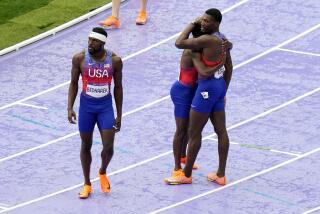THE SEOUL GAMES : Men’s Relay Races : For U.S., It Is Four for Gold, Four Left Out in Cold
- Share via
SEOUL — Because of a disqualification in the men’s 400-meter relay, an event it usually wins, the United States runners Saturday passed the baton and the buck to its 1,600-meter team.
They took it and ran with it.
Started by UCLA students Danny Everett and Steve Lewis, and anchored by the man Lewis had upset for the gold medal in the individual 400 meters, Butch Reynolds, the Americans won in world-record time, Reynolds finishing more than 4 seconds ahead of the next-closest runner.
They ran 2 minutes 56.16 seconds--tying a world record that was set by the U.S. in the advantageous high altitude of Mexico City at the 1968 Olympics.
Everett opened a lead after one lap, and Lewis widened it considerably on the next. By the time Kevin Robinzine of Southern Methodist University handed off to Reynolds, the former Ohio State star was a good 30 meters in front. Reynolds won by at least 40 meters, with Jamaica second in 3:00.30, France third in 3:00.56.
In winning, the 1,600-meter team took some of the sting out of what befell the Americans in the 400-meter relay.
Because of a bungled baton handoff and subsequent zone violation in a preliminary race the previous day, the U.S.’s 400-meter team was stopped in its tracks on its way to the final, which was won by the Soviet Union.
The disqualification cost Carl Lewis a chance at his eighth Olympic medal--and fourth of these Games--and Lewis was not even part of the lineup that fouled. He presumably was being saved for Saturday’s semifinals and final, much to his chagrin.
The United States had won every 400-meter relay it had entered except for 1912 (Great Britain) and 1960 (West Germany).
This time it went to the Soviets, who also won the race in 1980 when the Americans did not compete. Victor Bryzgine, Vladimir Krylov, Vladimir Mouraviev and Vitali Savine were Saturday’s winners in 38.19 seconds, but did not break the world record 37.83 set by the United States in the 1984 Olympic final.
Great Britain was second, France third. British anchorman Linford Christie, silver medalist behind Lewis in the 100 meters that originally belonged to Ben Johnson, had just been cleared to run Saturday morning after having tested positive for ephedrine, a stimulant.
Officials judged Christie’s drug use inadvertent. He said he had ingested the stimulant in ginseng tea.
Considering the chaos surrounding the selection of the U.S. men’s 400-meter relay team, it was hardly a surprise that it met with disaster.
Television replays indicated that it was the anchor runner, Lee McNeill, who made the mistake, failing to take the handoff from Calvin Smith until he was 6 or 7 meters beyond the 20-meter zone designated for handoffs. Smith hit McNeill in the hand with the baton 3 times before the exchange was made.
“My hand was shaking so bad,” McNeill said. “I gave him a shaky target.”
“Any time you miss someone with the baton three times, you know you’re getting pretty close to the zone,” Smith said.
But when the officials raised the white flag to indicate a legal exchange, the U.S. team thought that it had escaped detection.
Not so. Officials from the Soviet Union, Nigeria and France, whose teams weren’t even in the U.S. heat, protested. After meeting for an hour, hearing from all the parties and watching the videotape, the international track and field federation’s jury of appeals disqualified the United States.
Lewis, who was watching from the stands, placed blame on U.S. sprint coach Russ Rogers, the head women’s coach at Ohio State, but that’s hardly a surprise because Lewis and Rogers have been feuding all summer.
At one point, Rogers threatened to kick Lewis off the team, which Lewis said was fine because he didn’t want to run as long as Rogers was the coach. They got beyond that, but it was an uneasy truce.
“It was not Lee McNeill’s fault,” Lewis said. “The coach told us 10 minutes before the race which order we were going to run. Lee was in a difficult position. He’s never anchored before in a pressure situation. To ask someone to run the anchor 10 minutes before puts too much pressure on you.”
Lewis said that he and Olympic 200-meter champion Joe DeLoach were available for the first round but were not asked to run by Rogers. He presumably was saving them for Saturday’s semifinal and final.
There also was a question of whether McNeill should even have been on the Olympic team because he finished 8th in the 100 at the U.S. trials 2 months ago. Rogers was unavailable for comment, but speculation has been that he added McNeill to the team because Rogers also serves as McNeill’s manager.
“I’m just sorry because it deprived four young men of a gold medal and probably of a world record,” said Joe Douglas, Lewis’ manager. “They had maybe the best four men ever assembled for a 400-meter relay ready to run the final.”
The only other times the U.S. men have failed to win the Olympic 400-meter relay, except in the boycotted Games of 1980, were in 1912 and 1960, both in the final as a result of disqualifications. In 1912, the U.S. team also made the exchange out of the zone, and, in 1960, Ray Norton was called for running out of his lane.
More to Read
Go beyond the scoreboard
Get the latest on L.A.'s teams in the daily Sports Report newsletter.
You may occasionally receive promotional content from the Los Angeles Times.






